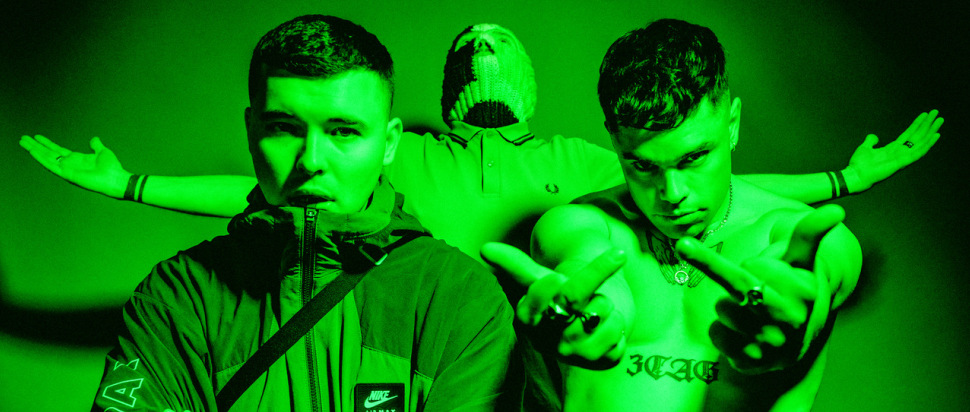Kneecap: Why the backlash?
Following Kneecap's Mo Chara being charged with a terror offence, we take a closer look at the Northern Irish band's fervent support of Palestine
Several days before our June issue went to print, Kneecap’s Liam Óg Ó hAnnaidh, better known as Mo Chara, was charged with a terrorism offence for… holding a flag.
For legal reasons, we of course don’t condone the waving of a terrorist organisation’s flag, nor are we calling for murder of politicians, but as the band themselves are keen to implore during this debacle: "We are not the story. Genocide is." Why can some musicians (cough: slowthai) do things like hoist the (pretend) severed head of Boris Johnson (sitting Prime Minister at the time!) live on national television and not get investigated by the police? Why can some people come out against the government and not face backlash? Why Kneecap? Why now?
There’s two important things to consider here. Not only what they’re protesting, but who it is doing the protesting. To understand Kneecap’s fervent support of Palestine, one only has to do a cursory glance through the history books. You don’t even have to read them, you can just look at the pictures.
Britain’s colonial past is no secret, but perhaps the specific links between Ireland and Palestine are less known. There is a reason why the oppression, murder and eradication of the nation of Palestine is felt acutely by Irish nationalists. From the very inception of the state of Israel in 1948, it has had deep ties with the United Kingdom (its creation was, after all, an idea of the British state) and the tactics it has used against the Palestinian people are lifted right from their actions in Ireland. In fact, some British soldiers who served in the Black and Tans literally went to Palestine themselves some years later, to enact the exact same terror there. The playbook is simple: you begin culturally – you take their language, you stop them being educated, you mock and diminish their music, their clothing, their very being, before you kill them.
One million Irish people died during the Great Famine of the 1840s. There was enough food on the island to feed those who were starving, those who were sent to work on menial tasks like building walls and roads to ‘earn’ the food that was withheld from them. A series of devastating, preventable decisions by the ruling British meant that entire generations of families were killed in the slowest, most painful way imaginable. The British held up their hands and sighed, there was nothing they could do. They tried their best to help. The population of Ireland still has not recovered from this. It echoes eerily the situation in Gaza. Enough food, just over the wall. Enough food but we just can’t get it through. Enough food, we sent it, it’s not our fault you haven’t got it. What can we do, we’re trying our best to help.
This is not even to mention the Troubles in the north, where Kneecap hail from, that – it is helpful to remember – only ended 27 years ago. Mo Chara himself is the same age as the Good Friday Agreement. This is not some far away conflict of the past, this is the world he grew up in. The events of the Troubles, a conflict of nearly 30 years, directly affected the generation of his parents, his grandparents, and have reverberated their way through his entire community. The actions of the British state in Belfast have shaped his entire worldview. And we are to be surprised that he sees himself in the Palestinian people? That the burned out buildings of Gaza remind him of the Belfast his parents walked through? That the threat of bombing, kidnap, murder, is not something that has been passed down to him?
It is no surprise the British government see the likes of Mo Chara and Kneecap as a threat. They refuse to let the British forget, refuse to let it all be washed away, swept under the rug, unspoken. They urge us to remember that the oppression of one is the oppression of all. They are holding out their hands to their sisters and brothers in Palestine and saying, we remember, we see you, we won’t let the world forget. And what is more dangerous to tyranny than hope?
Ní saoirse go saoirse na Phalaistíne.
